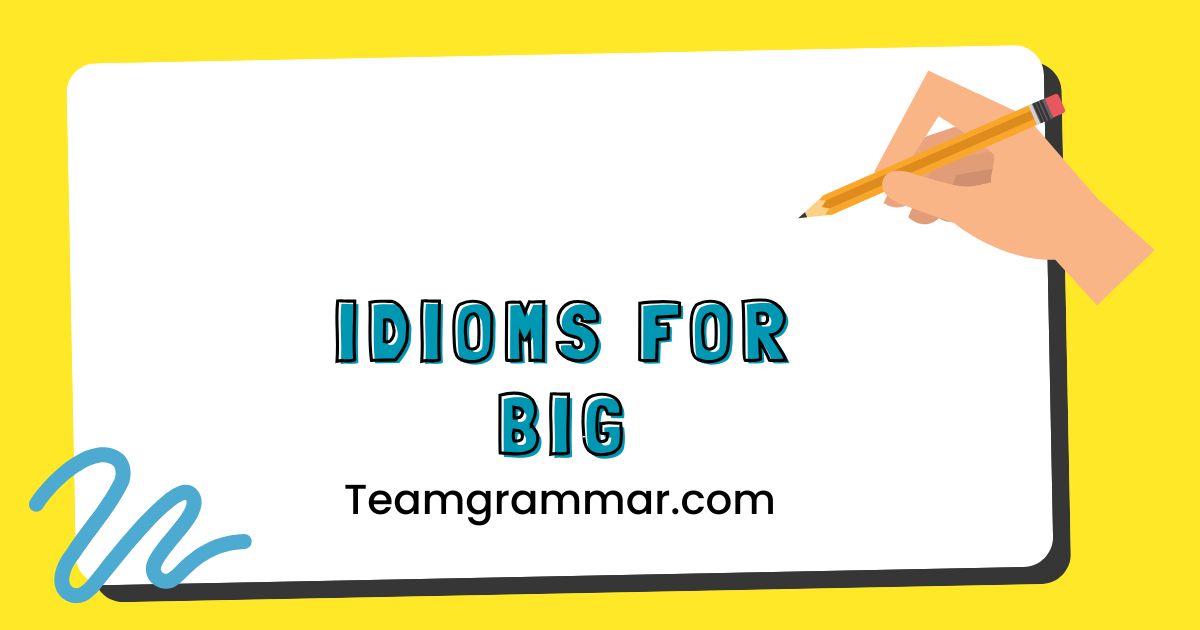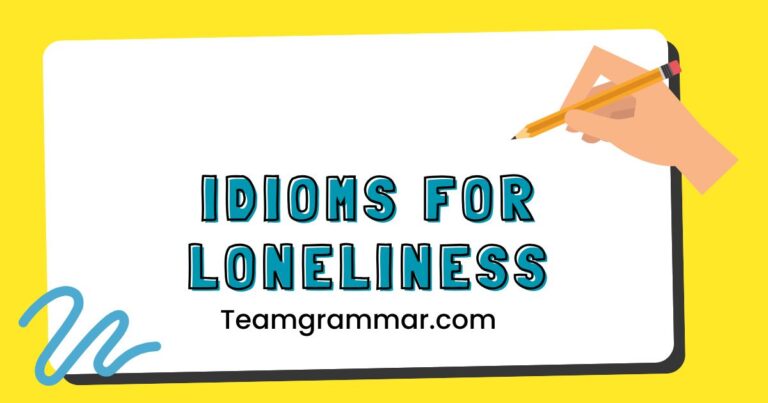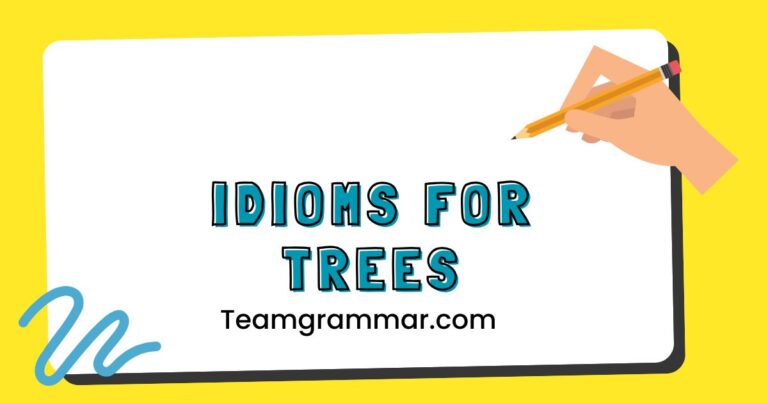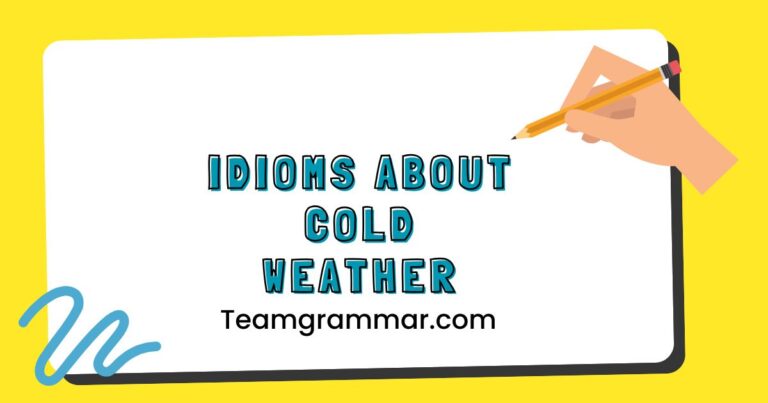29 Idioms for ‘Big’: Mastering Size and Scale in English
Understanding idioms is crucial for mastering English, as they add color and nuance to the language. Idioms related to “big” are particularly useful for describing size, scale, importance, and impact in various contexts.
This article provides a comprehensive guide to idioms for “big,” explaining their meanings, usage, and providing numerous examples. This resource is ideal for English language learners of all levels aiming to enhance their vocabulary and comprehension skills, as well as native speakers looking to refine their understanding of idiomatic expressions.
By exploring these idioms, learners will gain a deeper understanding of how native English speakers convey concepts of size, significance, and impact in a vivid and engaging manner. This knowledge will not only improve comprehension but also enable more effective and expressive communication in both spoken and written English.
Table of Contents
- Introduction
- Definition of Idioms for “Big”
- Structural Breakdown
- Types and Categories of Idioms for “Big”
- Examples of Idioms for “Big”
- Usage Rules for Idioms for “Big”
- Common Mistakes with Idioms for “Big”
- Practice Exercises
- Advanced Topics
- FAQ
- Conclusion
Definition of Idioms for “Big”
Idioms for “big” are expressions that use the concept of size or scale to convey meanings beyond the literal interpretation of the words involved. These idioms can describe physical size, quantity, importance, influence, or even exaggeration.
They are often figurative and culturally specific, making them an essential aspect of understanding nuanced English communication.
Classification: Idioms for “big” can be classified based on the aspect they emphasize, such as size (e.g., “a big deal”), quantity (e.g., “big bucks”), importance (e.g., “big cheese”), or impact (e.g., “big time”).
Function: These idioms function to add emphasis, color, and emotional impact to communication. They allow speakers and writers to convey complex ideas in a concise and memorable way.
Contexts: Idioms for “big” are used in a wide range of contexts, including everyday conversations, business communications, journalistic writing, and creative literature. The specific context often determines which idiom is most appropriate.
Structural Breakdown
The structure of idioms for “big” varies depending on the specific expression. However, many of these idioms follow common patterns:
- Noun + Adjective (Big): Many idioms use “big” as an adjective modifying a noun, such as “big deal,” “big shot,” or “big picture.” The noun provides the core meaning, while “big” amplifies or qualifies it.
- Verb + Big: Some idioms involve a verb combined with “big,” often indicating the manner or extent of the action, such as “think big” or “go big.”
- Prepositional Phrases: Idioms can also be part of prepositional phrases, such as “in a big way” or “on a big scale.”
- Figurative Language: Many idioms rely on metaphor or hyperbole to convey their meaning. For example, “larger than life” uses a metaphor to describe someone with an extraordinary personality.
Understanding these structural patterns can help learners recognize and interpret new idioms more easily. By analyzing the components of an idiom, one can often infer its general meaning, even if the specific expression is unfamiliar.
Types and Categories of Idioms for “Big”
Idioms for “big” can be categorized based on the specific aspect they emphasize. Here are some common categories:
Idioms Describing Size and Quantity
These idioms focus on physical size, numerical quantity, or extent.
Examples include: “a big pile,” “a big chunk,” “oodles of” to imply a large amount.
Idioms Describing Importance and Significance
These idioms highlight the importance, relevance, or impact of something.
Examples include: “a big deal,” “a major player,” “the big cheese.”
Idioms Describing Impact and Influence
These idioms emphasize the effect or influence that something has on a situation or person.
Examples include: “make a big splash,” “a big influence,” “have a big impact.”
Idioms Describing Exaggeration
These idioms use the concept of “big” to exaggerate or overstate something.
Examples include: “larger than life,” “a big fish in a small pond,” “a tall tale.”
Idioms Describing Generosity
These idioms relate to being generous or magnanimous.
Examples include: “have a big heart,” “a big spender,” “give big.”
Examples of Idioms for “Big”
The following tables provide extensive examples of idioms for “big,” categorized by their primary meaning. Each table includes the idiom, its meaning, and an example sentence.
Idioms Describing Size and Quantity
This table presents idioms that are used to describe physical size, amount, or extent of something. These idioms often help in vividly portraying the magnitude of objects or situations.
| Idiom | Meaning | Example Sentence |
|---|---|---|
| A big pile | A large quantity of something | There was a big pile of laundry waiting to be washed. |
| A big chunk | A significant portion of something | He spent a big chunk of his savings on the new car. |
| Oodles of | A very large quantity of something | She has oodles of friends and admirers. |
| A great deal | A large amount | He spent a great deal of time studying for the exam. |
| Tons of | A large quantity | We have tons of work to do before the deadline. |
| Loads of | A large amount | She has loads of experience in the field. |
| Mountains of | A very large quantity | He had mountains of paperwork to complete. |
| A whale of a | A large or impressive example | They had a whale of a time at the party. |
| A king’s ransom | A large amount of money | That painting must be worth a king’s ransom. |
| Overflowing with | Filled to an excessive extent | The stadium was overflowing with enthusiastic fans. |
| Generous helping | A large serving of food | She gave me a generous helping of mashed potatoes. |
| Large scale | Extensive or widespread | The project required a large-scale investment. |
| Big time | To a great extent; seriously | He failed big time on his final exam. |
| Big on | Very fond of | She is big on healthy eating. |
| Big numbers | Large amounts or quantities, often in monetary terms. | The company reported big numbers this quarter. |
| A big serving | A large amount of food | He asked for a big serving of pasta. |
| Big spender | Someone who spends a lot of money. | He is known as a big spender around town. |
| Big money | A large sum of money | He wants to make big money in the stock market. |
| Big league | The highest level of a profession or activity | He finally made it to the big leagues in baseball. |
| Big ticket item | An expensive item, usually a major purchase | A car is usually a big-ticket item. |
| Big box store | A very large retail store | We bought the TV at a big box store. |
| A big bite | A large piece or portion | He took a big bite out of the apple. |
| In bulk | In large quantities | We buy paper towels in bulk to save money. |
| Heaps of | A large amount | She had heaps of clothes to donate. |
Idioms Describing Importance and Significance
This table focuses on idioms that denote the importance, relevance, or significance of something, often used to emphasize the impact or influence of a person or event.
| Idiom | Meaning | Example Sentence |
|---|---|---|
| A big deal | Something important or significant | Getting this promotion is a big deal for her career. |
| A major player | An important or influential person or organization | That company is a major player in the tech industry. |
| The big cheese | The most important person in an organization | He’s the big cheese around here, so you should listen to him. |
| Big shot | An important or influential person | He thinks he’s a big shot because he’s the CEO. |
| Big name | A famous or well-known person | The concert featured several big names in the music industry. |
| Big fish | An important person in a small group | He’s a big fish in a small pond in his hometown. |
| Big picture | The overall perspective or context | We need to focus on the big picture and not get bogged down in details. |
| Big league | The highest level of a profession or activity | He finally made it to the big leagues in baseball. |
| Carry weight | To be influential or important | His opinion carries a lot of weight in the company. |
| Of great consequence | Very important or significant | The decision was of great consequence to the future of the company. |
| Matter a great deal | To be very important | Her support matters a great deal to me. |
| Of importance | Important or significant | The issue is of great importance to the community. |
| Significant | Important or notable | The discovery was significant for the field of medicine. |
| Momentous | Of great importance or significance, especially in its bearing on the future | The signing of the treaty was a momentous occasion. |
| Principal | Most important or influential | Education is the principal means of social mobility. |
| Paramount | More important than anything else; supreme | Safety is paramount in this situation. |
| Foremost | Most prominent or important | He is one of the foremost experts on climate change. |
| Vital | Absolutely necessary or important; essential | Water is vital for survival. |
| Critical | Expressing adverse or disapproving comments or judgments; or, of crucial importance in relation to the development or success of something | The situation is critical and requires immediate action. |
| Crucial | Decisive or critical, especially in the success or failure of something | Good communication is crucial for a successful relationship. |
| Key | Of crucial importance | Teamwork is key to achieving our goals. |
| Central | Of the greatest importance; principal or essential | The customer is central to our business strategy. |
| Major league | Of the highest caliber or importance | The company is a major league player in the industry. |
Idioms Describing Impact and Influence
This table highlights idioms that describe the degree of impact or influence something has on a situation or person, useful for expressing how influential or effective something is.
| Idiom | Meaning | Example Sentence |
|---|---|---|
| Make a big splash | To create a significant impact or stir | The new product made a big splash in the market. |
| A big influence | Someone or something that has a significant effect | His father was a big influence on his career choice. |
| Have a big impact | To have a significant effect on something | The new policy will have a big impact on the environment. |
| A game changer | Something that significantly alters the current situation | The new technology is a game changer for the industry. |
| Move mountains | To overcome significant obstacles | She had to move mountains to get the project approved. |
| A force to be reckoned with | Someone or something that should be taken seriously | The new company is a force to be reckoned with in the market. |
| Carry a lot of weight | To have a significant influence | His opinion carries a lot of weight in the decision-making process. |
| Make waves | To cause a disturbance or controversy | He likes to make waves with his controversial opinions. |
| Leave a mark | To have a lasting impact | Her contributions have left a mark on the organization. |
| Set the world on fire | To achieve great success or make a significant impact | He is determined to set the world on fire with his inventions. |
| Loom large | To appear very important or threatening | The challenges ahead loom large for the company. |
| Have a hand in | To be involved in influencing something | He had a hand in the success of the project. |
| Call the shots | To be in control or make decisions | The CEO calls the shots in the company. |
| Pull strings | To use influence to get something done | He had to pull strings to get his son into the school. |
| Have a say | To have the right to express an opinion or influence a decision | Everyone should have a say in the matter. |
| Big brother | A person or organization exercising total control over people’s lives. | Some people worry that the government is becoming like big brother. |
Idioms Describing Exaggeration
This table includes idioms that use the concept of “big” to exaggerate or overstate something, often used for dramatic or humorous effect.
| Idiom | Meaning | Example Sentence |
|---|---|---|
| Larger than life | Having an exaggerated or extraordinary personality | The actor’s stage presence was larger than life. |
| A big fish in a small pond | Someone who is important in a small group but not in a larger one | He’s a big fish in a small pond in his hometown, but nobody knows him in the city. |
| A tall tale | An exaggerated or unbelievable story | He told us a tall tale about his adventures in the jungle. |
| Make a mountain out of a molehill | To exaggerate the importance of something trivial | She’s making a mountain out of a molehill over a small mistake. |
| Blow out of proportion | To exaggerate the importance or scale of something | The media is blowing the scandal out of proportion. |
| Big talk | Exaggerated or boastful statements | He’s all big talk, but he never delivers. |
| Big headed | Having an exaggerated sense of one’s own importance or abilities | He’s a bit big-headed since he got the promotion. |
| Think big | To have ambitious goals or plans | You need to think big if you want to succeed in this industry. |
| Big words | Difficult or impressive vocabulary used to impress others | He used big words to try to sound intelligent. |
| Big ideas | Ambitious or grand plans | He’s full of big ideas, but he rarely follows through. |
| Big promises | Extravagant commitments that are unlikely to be fulfilled | Politicians often make big promises during election campaigns. |
| Big dreams | Ambitious aspirations | She has big dreams of becoming a famous actress. |
| A world of difference | A very significant difference | There’s a world of difference between the two products. |
Idioms Describing Generosity
This table lists idioms related to being generous or magnanimous, often describing someone’s willingness to give or share.
| Idiom | Meaning | Example Sentence |
|---|---|---|
| Have a big heart | To be kind and generous | She has a big heart and always helps those in need. |
| A big spender | Someone who spends a lot of money | He’s a big spender and always buys expensive gifts. |
| Give big | To donate a large amount of money or resources | The charity encourages people to give big during the holiday season. |
| Large hearted | Generous and compassionate | She is known for her large-hearted nature. |
| Open handed | Generous and willing to give | He is open-handed with his money and always helps his friends. |
| A generous spirit | A kind and giving attitude | She has a generous spirit and always puts others first. |
| Give the shirt off one’s back | To be extremely generous, even to the point of self-sacrifice | He would give the shirt off his back to help a friend in need. |
| A big tipper | Someone who leaves large tips | He is known as a big tipper at the restaurant. |
| Deep pockets | Having a lot of money or resources | The company has deep pockets and can afford to invest in new technology. |
| Spread the wealth | To share one’s resources with others | He believes in spreading the wealth and donating to charity. |
| Be free with | To be generous with something | She is always free with her advice and support. |
| Be flush with | Having an abundance of something, especially money | He is flush with cash after selling his company. |
Usage Rules for Idioms for “Big”
Using idioms correctly requires understanding their specific meanings and contexts. Here are some general rules to follow:
- Context Matters: The appropriateness of an idiom depends on the context of the conversation or writing. Consider the audience, tone, and purpose of the communication.
- Figurative Meaning: Remember that idioms have figurative meanings that differ from the literal meanings of the words involved.
- Cultural Sensitivity: Be aware that some idioms are culturally specific and may not be understood or appreciated by people from different backgrounds.
- Grammatical Structure: Use the correct grammatical structure for the idiom. For example, use the correct verb tense and word order.
- Overuse: Avoid overuse of idioms, as it can make your writing or speech sound unnatural or cliché.
Exception: Some idioms are more flexible than others. For example, “big” can sometimes be replaced with synonyms like “large” or “great,” depending on the specific idiom and context.
However, it’s essential to be cautious and ensure that the substitution doesn’t alter the meaning or sound awkward.
Common Mistakes with Idioms for “Big”
Learners often make mistakes when using idioms for “big.” Here are some common errors and how to avoid them:
| Incorrect | Correct | Explanation |
|---|---|---|
| He is a large deal. | He is a big deal. | “Big deal” is the correct idiom, not “large deal.” |
| She thinks in big. | She thinks big. | The correct idiom is “think big,” without the preposition “in.” |
| That costed a king’s wealth. | That cost a king’s ransom. | The idiom is “a king’s ransom,” not “a king’s wealth.” |
| He made a hill out of a molehill. | He made a mountain out of a molehill. | The correct idiom is “mountain out of a molehill,” not “hill out of a molehill.” |
| She has a big stomach. | She has a big heart. | “Big stomach” refers to physical size, while “big heart” refers to kindness. |
Practice Exercises
Test your understanding of idioms for “big” with these practice exercises.
Exercise 1: Fill in the Blanks
Fill in the blanks with the correct idiom for “big.”
| Question | Answer |
|---|---|
| 1. Getting this job is a ________ for me. | big deal |
| 2. He is the ________ in the company. | big cheese |
| 3. She always ________ and dreams of becoming a famous actress. | thinks big |
| 4. The project required a ________ investment. | large-scale |
| 5. He failed ________ on his final exam. | big time |
| 6. The new product made a ________ in the market. | big splash |
| 7. He’s a ________ in a small pond; everyone knows him here. | big fish |
| 8. She has ________ of experience in this field. | loads |
| 9. His opinion ________ in the company. | carries weight |
| 10. That painting must be worth ________. | a king’s ransom |
Exercise 2: Match the Idiom to its Meaning
Match the idiom on the left with its meaning on the right.
| Idiom | Meaning |
|---|---|
| 1. A big spender | a. To exaggerate the importance of something trivial |
| 2. A tall tale | b. Someone who spends a lot of money |
| 3. To make a mountain out of a molehill | c. An exaggerated or unblievable story |
| 4. A generous spirit | d. Kind and giving attitude |
Answers:
1-b, 2-c, 3-a, 4-d
Exercise 3: Use the Idiom in a Sentence
Write a sentence using each of the following idioms.
- Big picture
- Big on
- A big pile
- Have a big heart
- Big brother
Example Answers:
- It’s important to see the big picture and not get lost in the details.
- She is big on organic food.
- There was a big pile of leaves in the yard.
- He has a big heart and is always willing to help others.
- Some people worry that the government is acting like big brother, monitoring their every move.
Advanced Topics
For advanced learners, exploring the etymology and historical context of idioms can provide a deeper understanding of their meanings and usage. Additionally, analyzing how idioms are translated and adapted in different languages can offer insights into cultural differences and linguistic nuances.
Another advanced topic is the creation and evolution of new idioms. Language is constantly evolving, and new idioms emerge over time.
Studying the processes by which these idioms are formed and disseminated can enhance one’s understanding of language change and creativity.
Furthermore, examining the use of idioms in literature and rhetoric can reveal how skilled writers and speakers use these expressions to create vivid imagery, evoke emotions, and persuade their audiences. Analyzing the effectiveness of different idioms in various contexts can improve one’s own communication skills.
FAQ
- What is an idiom?
An idiom is a phrase or expression whose meaning cannot be understood from the literal meanings of its individual words. It is a figurative expression that has a conventional meaning known to native speakers of the language.
- Why are idioms important to learn?
Idioms are essential for understanding and communicating effectively in English because they are commonly used in everyday conversations, writing, and media. Knowing idioms helps you understand the nuances of the language and avoid misinterpretations.
- How can I learn idioms effectively?
You can learn idioms effectively by reading widely, listening to native speakers, using flashcards, and practicing using idioms in your own writing and speech. Pay attention to the context in which idioms are used to understand their meanings accurately.
- Are idioms universal across all cultures?
No, idioms are often culturally specific and may not be understood by people from different backgrounds. Some idioms may have equivalents in other languages, but their literal translations may not make sense.
- Can I create my own idioms?
While you can create new expressions, they are not considered idioms until they become widely accepted and used by native speakers. Idioms typically evolve over time and become part of the common language.
- How do I know when to use an idiom?
Use idioms when they are appropriate for the context, audience, and tone of your communication. Avoid using idioms in formal or technical writing, where clarity and precision are essential. Be mindful of cultural differences and avoid using idioms that may be offensive or misunderstood.
- Is it okay to mix idioms in a sentence?
While it’s generally best to avoid mixing idioms, as it can sound awkward or confusing, sometimes a creative combination can be effective if done intentionally and with a clear understanding of the meanings. However, it’s safest to stick to using idioms in their standard forms.
- How can I improve my understanding of idioms in context?
To improve your understanding of idioms in context, pay close attention to how native speakers use them in various situations. Watch movies and TV shows, listen to podcasts, and read books and articles. Take note of the context, tone, and audience to get a better sense of when and how to use idioms effectively.
Conclusion
Mastering idioms for “big” is a significant step towards achieving fluency and expressiveness in English. By understanding the meanings, usage rules, and common mistakes associated with these idioms, learners can enhance their comprehension and communication skills.
Through consistent practice and exposure to authentic language, one can confidently incorporate these idioms into their everyday conversations and writing.
Remember to pay attention to the context, cultural nuances, and figurative meanings of idioms. Avoid overuse and be mindful of your audience.
With dedication and practice, you can master idioms for “big” and elevate your English language skills to new heights. Keep practicing, keep exploring, and enjoy the richness and color that idioms bring to the English language.







